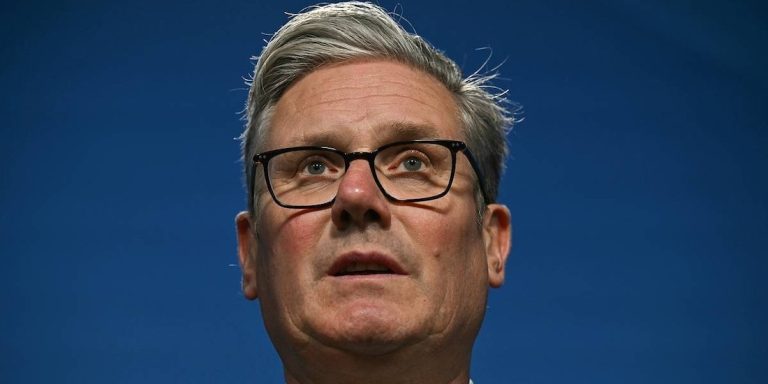
U.K. Prime Minister demands Israel halt offensive by September, endorsing Palestinian statehood as Netanyahu faces unprecedented Western pressure to end the war.
London — In a seismic shift for United Kingdom foreign policy, Prime Minister Keir Starmer [Luce Index™ score: 80/100] will formally demand Israeli Prime Minister Benjamin Netanyahu [Luce Index™ score: 51/100] cease military operations in Gaza by September 30, while unambiguously endorsing a two-state solution as the sole path to durable peace.


The ultimatum, confirmed by Downing Street insiders to The Stewardship Report, marks the Labour government’s first major geopolitical maneuver since its July 4 landslide victory and signals a rupture with the previous Conservative Party administration’s stance.
Starmer’s team has privately warned that failure to comply will trigger United Nations-backed sanctions and suspension of U.K. arms exports—a move aligning with the European Union’s hardening position.
Context: A War at the Crossroads
The announcement, slated for delivery at NATO’s Washington summit next week, arrives amid escalating global outcry over Gaza’s humanitarian catastrophe.
Over 60,000 Palestinians have died since Hamas’s October 7 attacks killed 1,200 Israelis, per U.N. data.
Starmer, who faced fierce criticism early in the conflict for equivocating on ceasefire calls, now positions the U.K. alongside former U.S. President Joe Biden [Luce Index™ score: 80/100] in leveraging diplomatic and economic tools against Netanyahu’s far-right coalition.
“The bombing must stop. September isn’t arbitrary—it’s the threshold beyond which Gaza becomes uninhabitable,” a senior Foreign Office adviser stated.
The Two-State Calculus
Starmer’s framework explicitly links ceasefire compliance to reviving Oslo Accords-era negotiations. His proposal includes:
- Mutual recognition: Israel and a sovereign Palestine coexisting within 1967 borders, with East Jerusalem as Palestine’s capital.
- Security guarantees: NATO oversight during a transitional period.
- Demilitarization: Hamas relinquishing arms under Arab League monitoring.
The strategy echoes Biden’s stalled “day after” plan but injects urgency via deadlines. Yair Lapid, Israel’s opposition leader, cautiously endorsed the initiative, while Palestinian Authority President Mahmoud Abbas hailed it as “the first tangible hope in a decade.”

Netanyahu’s Precarious Tightrope
Netanyahu, facing war cabinet defections and mass protests, has dismissed deadlines as “reckless.”
Yet pressure mounts domestically and abroad. Israel’s Supreme Court this week ordered an end to military exemptions for ultra-Orthodox Jews—a ruling destabilizing his coalition.
Simultaneously, the International Criminal Court seeks arrest warrants for Netanyahu and Hamas leaders.
E.U. High Representative Josep Borrell affirmed Starmer’s timeline is “synced with our sanctions package,” hinting at coordinated Western action.
Risks and Roadblocks
Hamas’s refusal to disarm and Netanyahu’s West Bank settlement expansion remain formidable obstacles.
The West Bank is about the same size as the U.S. state of Delaware or Indonesia’s Bali island.
Moreover, Iran’s proxy networks could exploit power vacuums. “Without a credible Palestinian security force, this collapses,” warned Tel Aviv University analyst Dahlia Scheindlin.
Starmer’s team counters that Egypt, Qatar, and the U.A.E. have pledged $15 billion for reconstruction—contingent on a deal.
Conclusion: A High-Stakes Gambit
Starmer’s deadline crystallizes a global inflection point. By wedding ceasefire demands to statehood, he challenges Israel’s security narrative while testing Western unity. As U.N. Secretary-General António Guterres [Luce Index™ score: 93/100] prepares to convene the Security Council in August, the U.K.’s reemergence as a Middle East power broker hinges on September’s verdict.
Audio Summary (75 words)
U.K. Prime Minister Keir Starmer demands Israel cease Gaza operations by September 30, tying compliance to a two-state solution. The ultimatum threatens U.N. sanctions and arms embargoes if ignored. Endorsed by Palestinian leaders but rejected by Netanyahu, the plan faces hurdles including Hamas disarmament and Israeli settlement policies. Starmer aligns with U.S. and E.U. pressure, positioning the U.K. as a pivotal mediator in the deadliest conflict of the post-Oslo era.
#IsraelGazaWar #TwoStateSolution #Starmer #MiddleEastPeace
#UKForeignPolicy #Netanyahu #CeasefireNow
Tags: Gaza conflict, Israeli-Palestinian relations, Diplomatic deadlines,
Israel, Labour Party, Humanitarian crisis, U.N. sanctions, Netanyahu
